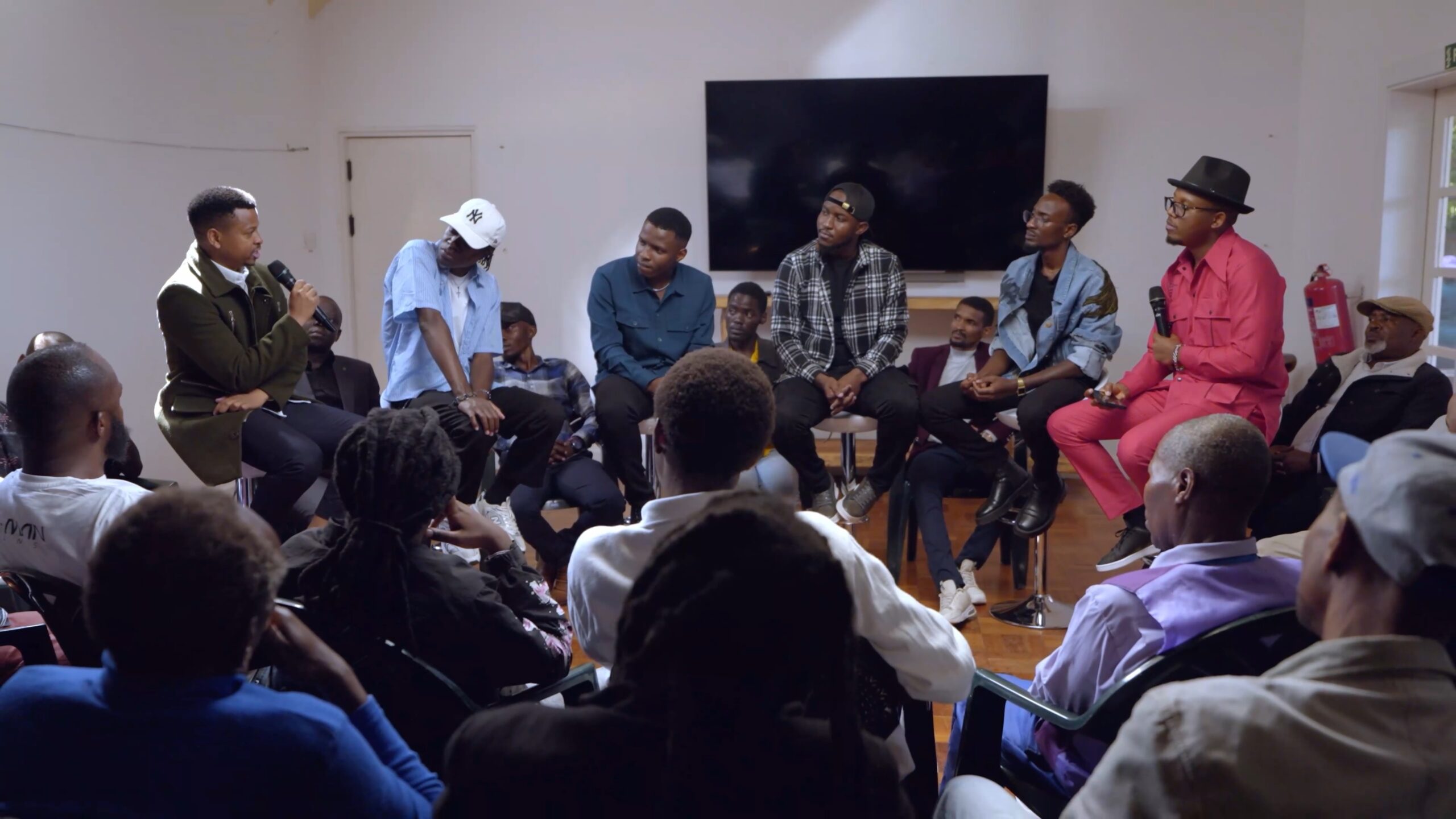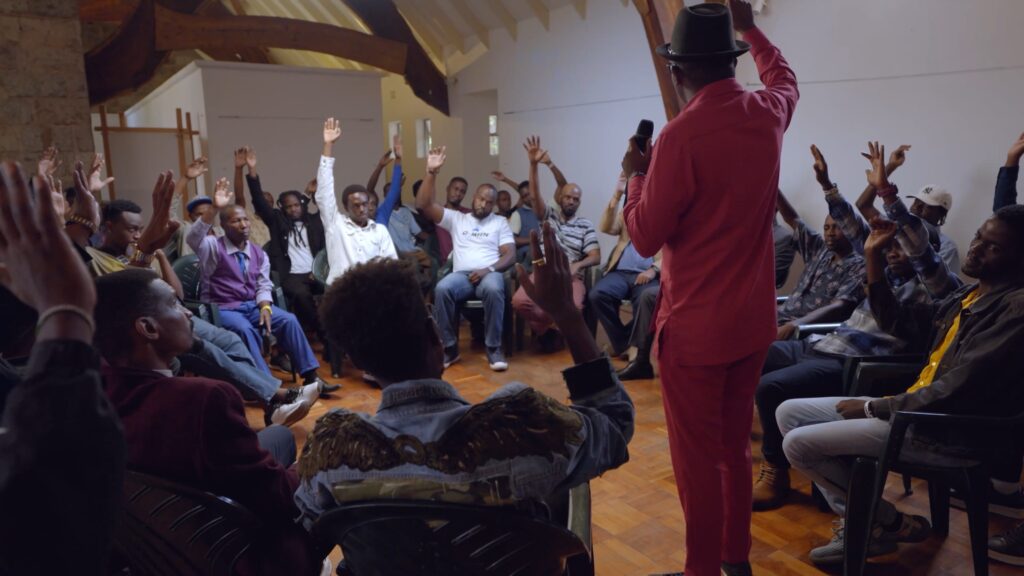
First-Ever Men’s Conference Tackles Femicide and GBV in Kenya, Inspired by Abel Mutua’s Viral Video » Capital News
NAIROBI, Kenya Feb 17 – For years, the so-called Men’s Conference has been a running joke—a mythical gathering men conveniently “attended” every Valentine’s Day to escape romantic obligations. But on February 14, 2025, that changed.
Instead of jokes, laughter and banter about avoiding flowers and dinner dates, men from all walks of life came together for something different—an unfiltered conversation about gender-based violence (GBV). The shift wasn’t accidental. It started with a viral video.
Earlier this month, award-winning actor and filmmaker Abel Mutua posed a simple but loaded question online:
“Assuming morio wako ama hata bro wako pale nyumbani anakosea, utamuambia outrightly, ‘Buda, manze rada chafu… unachoma’?”
(If your friend or even your brother at home is in the wrong, would you call him out and say, ‘Bro, that’s not okay… You’re out of line’?”)
The response was overwhelming. Men admitted they had stayed silent when they saw their friends mistreating women. Some feared losing friendships, while others simply didn’t know how to intervene. But one thing was clear—silence was costing lives.
Then came the statistics: 170 reported femicide cases in 2024 alone. The perpetrators? Mostly men. Husbands. Boyfriends. Partners.
Kenya was facing a crisis, and Abel listened. Instead of letting the conversation fade away, he took action.

The Men’s Conference—With a Difference
What had once been a meme became a movement. Abel, alongside award-winning director Isaya Evans, who tragically lost his colleague Lillian to femicide in November 2023, organized the first-ever real Men’s Conference on Valentine’s Day.
The room wasn’t filled with jokes about dodging love letters. Instead, it was packed with men from different professions—influencers like Mike Muchiri, Nick Kwach, Presenter Ali, The Real Chiche, J Segera; businessmen, actors, professionals, pastors, fathers, and husbands—all gathered for one reason: to discuss the role men play in ending violence against women.
The conference tackled a harsh but undeniable truth—femicide doesn’t start with murder. It begins with unchecked behaviour: sexist jokes, verbal abuse, emotional manipulation, and physical violence that goes unchallenged.
Surprisingly, no one in the room believed violence against women was acceptable. Yet, nearly every man admitted to ignoring red flags from their peers.
When asked “Why?” the answers were the same:
“I didn’t want to seem disrespectful.”
“I thought it wasn’t my business.”
“I wasn’t sure what to say.”
But as the conversation deepened, the reality hit home. Their silence wasn’t neutral—it was dangerous.
Safisha Rada—A New Code for Accountability
By the end of the discussion, one phrase emerged as a turning point: Safisha Rada—Swahili for “Clean Up Your Act.”
It became a new way for men to hold each other accountable without hostility. A way to say, “Bro, that’s not okay,” without turning it into an attack. A way to challenge their friends without pushing them away.

For Abel, this was more than just a conference. It was personal.
“This is a cause close to my heart. Last year, I hosted Africa’s largest movie premiere with my film Makosa Ni Yangu as a wake-up call for society. Then, a simple video I posted about holding friends accountable went viral, showing just how much men need a space to have real, honest conversations,” he said.
*”That’s why we held the first-ever real Men’s Conference on Valentine’s Day. It was real, it was raw, and it was necessary. Men from all walks of life showed up, engaged in unfiltered conversations, and acknowledged our role in ending GBV.
“This isn’t about blaming men—it’s about challenging men to be better.”*
Redefining Brotherhood
The conversation didn’t end with Abel. The message resonated far beyond the room, drawing support from influential figures across Kenya.
Ferdinand Omanyala, Africa’s fastest man, drew parallels between sports and life:
“In athletics, accountability is everything. You can’t achieve greatness without holding yourself and your teammates to the highest standards. The same applies in life—men must stop excusing bad behavior.”
Stephen Letoo, Citizen TV’s self-styled Men’s Conference Chairman, dropped the jokes and got serious:
“It’s time men stood up against vices committed by their peers. We must face each other and tell each other the truth. Let’s start talking. Let’s always speak out.”
John-Allan Namu, an award-winning investigative journalist, emphasized the power of media:
“Men in media have a duty to shape the conversation on masculinity, respect, and accountability. Our platforms must amplify the right messages and challenge toxic narratives.”
Martin Kariuki, presenter on Capital FM’s The Jam, challenged men to stop fearing uncomfortable conversations:
“Tusiogopane (Let’s not fear each other). Let’s tell each other the truth openly when one of us goes wrong. Holding each other accountable is the only way forward.”
A Movement, Not Just a Moment
For Abel and Isaya, this is just the beginning.
“We’ve started a conversation, but it won’t end here. This is a movement. It’s time men took responsibility—not just in words, but in actions,” Abel said.
And so, on a day traditionally filled with flowers and chocolates, something different happened.
Men gathered, not to escape responsibility, but to embrace it. To acknowledge that silence is complicity. To commit to change.
For the first time, Men’s Conference wasn’t about avoiding Valentine’s Day.
It was about showing up—for women, for themselves, and for a future where accountability is not the exception, but the norm.